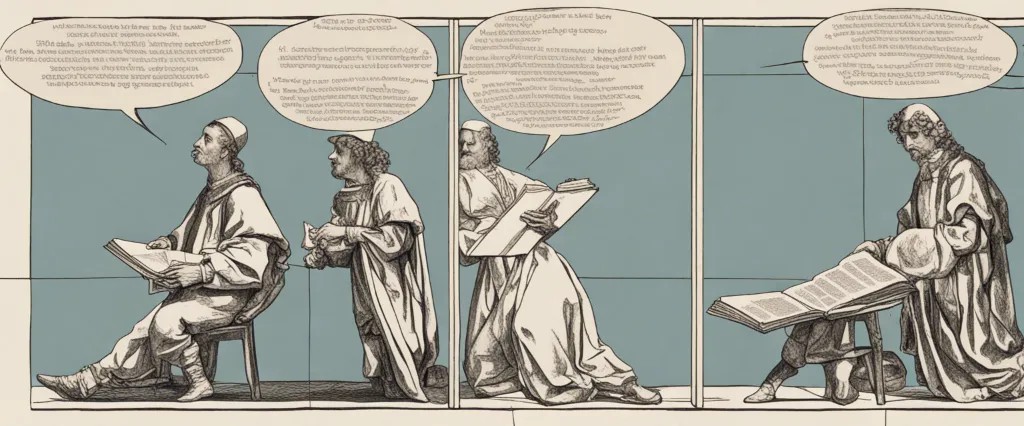
Chapter 1 What's Book The Life Of Lazarillo De Tormes by Anonymous
"The Life of Lazarillo de Tormes" is written anonymously.It is a Spanish picaresque novel, published in 1554. It is considered one of the earliest novels in the Western literary tradition and is credited with establishing the picaresque genre. The novel is written in the form of an autobiography and follows the life of Lazarillo, a young boy who grows up in poverty and becomes a servant to various masters, each of whom mistreats him in some way. Through his experiences, Lazarillo learns to survive and navigate the social hierarchy of 16th century Spain. The novel is known for its satirical depiction of society and its sharp criticism of the hypocrisy and corruption of the time.
Chapter 2 Is Book The Life Of Lazarillo De Tormes A Good Book
Yes, "The Life of Lazarillo de Tormes" is considered a classic of Spanish literature and is often studied in schools and universities. The book is a satirical novella that provides insight into the social and economic conditions of Spain during the 16th century. It is also known for its clever and engaging storytelling. Overall, it is a good book for those interested in literature, history, and satire.
Chapter 3 Book The Life Of Lazarillo De Tormes by Anonymous Summary
"The Life of Lazarillo de Tormes" is a picaresque novel written in the 16th century by an anonymous author. The story is narrated by Lazarillo, a poor boy who becomes a servant to a series of different masters throughout his life. Each master is morally corrupt and treats Lazarillo poorly, forcing him to resort to cunning and deception in order to survive.
Lazarillo's first master is a cruel and abusive blind man who mistreats him and barely provides enough food to eat. Lazarillo eventually leaves him and goes on to serve a series of masters, including a priest, a squire, and a friar. Each master teaches Lazarillo valuable lessons about the harsh realities of life and the necessity of deceit in order to get by.
As Lazarillo grows older, he becomes increasingly disillusioned with the world and the people around him. He struggles to find a moral compass in a society that values wealth and power above all else. The novel ends with Lazarillo reflecting on his experiences and the ways in which they have shaped him into the person he has become.
"The Life of Lazarillo de Tormes" is considered a classic of Spanish literature and is often credited with being the first picaresque novel. It offers a satirical and critical commentary on the social and moral values of 16th-century Spain, while also exploring the themes of poverty, deceit, and survival.

Chapter 4 Book The Life Of Lazarillo De Tormes Author
The author of "The Life of Lazarillo de Tormes" is anonymous, as the book was published anonymously in 1554 in Spain.
No other books by the author have been identified, as the author's identity remains unknown.
In terms of editions, there have been numerous editions of "The Life of Lazarillo de Tormes" published over the years. One of the best editions is considered to be the Norton Critical Edition, edited by Michael Harney, which includes critical essays and historical background on the book.
Chapter 5 Book The Life Of Lazarillo De Tormes Meaning & Theme
Book The Life Of Lazarillo De Tormes Meaning
The book "The Life of Lazarillo de Tormes" is a Spanish picaresque novel, written anonymously in the 16th century. It tells the story of a young boy named Lazarillo who grows up in poverty and becomes a cunning and resourceful beggar. The novel is a critique of the social hierarchy and hypocrisy of Spanish society during that time. It also serves as a commentary on the importance of wit and cleverness in navigating a harsh and unjust world.
Book The Life Of Lazarillo De Tormes Theme
The theme of "The Life of Lazarillo de Tormes" centers around the brutal realities of poverty and social inequality in 16th-century Spain. Through the story of Lazarillo, the anonymous author portrays the struggles faced by the lower class in a society that is harsh and unforgiving towards those who are less fortunate.
The theme of survival is also prominent throughout the novel, as Lazarillo must constantly adapt and use his wit to navigate the challenges and hardships of his environment. He learns to be resourceful and clever in order to survive, often resorting to deception and cunning in order to make his way in the world.
Additionally, the theme of hypocrisy and corruption within the Church and the upper class is a recurring motif in the book. Lazarillo encounters several characters who claim to be morally upright and virtuous, but who often reveal themselves to be selfish, cruel, and deceitful. This critique of societal hypocrisy adds depth to the novel and underscores the harsh realities faced by the poor and marginalized in Spanish society.
Overall, "The Life of Lazarillo de Tormes" explores themes of poverty, survival, social inequality, and hypocrisy, painting a vivid portrait of a society marked by cruelty and injustice. Through the character of Lazarillo, the author invites readers to reflect on the harsh realities of life for those on the margins of society, and to consider the ways in which individuals must navigate and survive in a world that is often hostile and unforgiving.
Chapter 6 Other Accessible Resources
- University library databases such as JSTOR, ProQuest, and EBSCOhost for scholarly articles and academic studies on "The Life of Lazarillo de Tormes"
- Online book retailers such as Amazon and Barnes & Noble for purchasing a copy of the book
- for book reviews, ratings, and discussions on "The Life of Lazarillo de Tormes"
- Google Books for access to digital copies and previews of the book
- Online forums and discussion groups dedicated to literature and Spanish literature in particular
- Wikipedia for a comprehensive overview of the plot, themes, and historical context of "The Life of Lazarillo de Tormes"
- Literary analysis websites such as SparkNotes and CliffsNotes for study guides and summaries of the book
- YouTube for video reviews, summaries, and discussions on "The Life of Lazarillo de Tormes"
- Social media platforms such as Twitter, Instagram, and Facebook for posts and discussions related to the book
- Academic journals and literary magazines for critical essays and scholarly interpretations of "The Life of Lazarillo de Tormes"

Chapter 7 Quotes of Book The Life Of Lazarillo De Tormes
The Free Book The Life Of Lazarillo De Tormes quotes as follows:
- "I began to understand that hunger is a great cook."
- "It is better to be quiet and be thought a fool, than to speak and remove all doubt."
- "There is no one who does not carry a burden of some kind."
- "One man’s bread is another man’s death."
- "The world is full of evil and greed, and it is the poor who suffer most."
- "A good reputation is worth more than all the silver and gold in the world."
- "It is better to be a happy beggar than a miserable king."
- "A true friend is worth more than a hundred false ones."
- "It is not the appearance, but the substance that counts."
- "The only way to truly know a person is to walk a mile in their shoes."
Chapter 8 Similar Books Like Book The Life Of Lazarillo De Tormes
- "Hopscotch" by Julio Cortázar - A groundbreaking novel that challenges traditional narrative structure and invites readers to engage with the story in a unique and interactive way.
- "One Hundred Years of Solitude" by Gabriel Garcia Marquez - A classic work of magical realism that explores the complexities of family, love, and the passage of time in a small Colombian town.
- "Anna Karenina" by Leo Tolstoy - If you enjoyed Tolstoy's writing style and storytelling in "War and Peace," you may also appreciate his exploration of themes such as love, society, and morality in this tragic tale of a woman torn between her desires and societal expectations.
- "One Hundred Years of Solitude" by Gabriel Garcia Marquez - This modern classic of magical realism weaves together generations of a family in the fictional town of Macondo, exploring themes of time, memory, and the cyclical nature of history in a captivating and lyrical narrative.
- "The Great Gatsby" by F. Scott Fitzgerald - This American classic explores themes of wealth, love, and the American Dream in the Jazz Age, following the tragic story of Jay Gatsby and his pursuit of the elusive Daisy Buchanan. Fitzgerald's elegant prose and vivid depiction of the era make this novel a compelling read for fans of literary fiction.